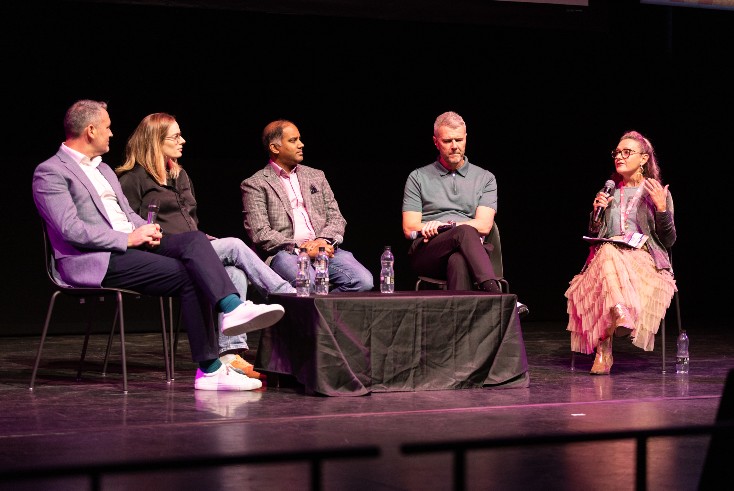Is the future of TV ‘all about data’?

The Future of Media Manchester
“We’re at a tipping point where quality data will drive effective outcomes — and it’s less about the cost per unit and it’s more about outcomes.”
Sam Taylor, interim marketing director at Direct Line Group, argued at The Future of Media Manchester last week that the future of TV’s success on media plans will hinge on broadcasters’ capacity to provide strong, privacy-centric first-party data and more flexibility to advertisers.
Progress has been made in recent years through the development of greater data and measurement tools for VOD platforms. Taylor said that, just five years ago, advertisers would have argued it’s “more effective to have wastage in a linear TV campaign than target on a VOD platform”, but that is no longer the case.
“When you look at it now and you look at the power of the data, through the effectiveness lens, suddenly it’s OK to pay five times more to access exposure on a VOD platform when it’s driving 10 times better outcomes.”
The focus on outcomes echoes comments previously made by ITV director of client strategy and planning Kate Waters, who at last year’s The Future of TV Advertising Global event argued that TV needs to become outcomes-driven to better compete against digital platforms.
Important to VOD’s development has also been the evolution of CFlight to give advertisers de-duplicated measurement across linear and VOD audiences. ITV, Sky and Channel 4 are also set to launch a joint measurement panel, dubbed Lantern, aimed at tracking the short-term impact of TV advertising on sales.
Flexibility is key
Reacting to a recent study by EssenceMediacom, based on data from Thinkbox’s Profit Ability 2 study released earlier this year, that found brands may be spending more than three times what is optimal on social media and potentially less than optimal on TV, Taylor said: “No shit.”
Speaking as part of a panel alongside Channel 4 head of sales and business development Ewan Douglas, Sky head of investment Amy Taylor and Samba TV vice-president of international customer success Jay Fowdar, the group agreed that digital platforms receive more spend than is typically optimal because they meet other needs for advertisers. Namely, they offer a high degree of flexibility and ease of activation, such as the ability to get an ad up within hours.
Improving flexibility of media buying on TV has been core to the development of VOD platforms. The success of platforms like ITVX, highlighted at last year’s ITV Palooza, is a reflection on the need to develop better measurement tools for advertisers — specifically sales attribution for media spend.
“Getting an ad live on ITVX or any VOD platform within a few hours of deciding you need to is something that takes TV to the next dimension. That high tide will float all TV boats,” continued Sam Taylor. He added that “TV wins all day long” when it comes to measuring attention and effectiveness.
Douglas suggested that TV has “become more flexible and that will continue to happen” to the benefit of advertisers.
Defending legacy trading agreements as still “important”, Douglas said the core goal of broadcasters is to “make content readily available for viewers […] and make it as easy as possible for advertisers to buy products”.
That said, he argued that broadcasters’ relationship with digital and social media platforms is mutually beneficial, noting that Channel 4 has used YouTube to reach new, younger audiences that advertisers can also access, without seeing any cannabilisation of Channel 4’s core linear and VOD audiences.
Performance is important, but so is reach and creative
While data was also highlighted by Amy Taylor and Fowdar as important to the future success of TV, Fowdar argued that TV’s exceptional capacity for reach should not be discounted.
“You can’t measure clicks on TV, which has always been the driving factor in digital,” said Fowdar, adding that he thinks metrics around cost per incremental house reach will become more important.
Samba TV’s research has found a demonstrable impact of media fragmentation on TV as a channel — something that could impact its capacity for reach. While still noting that TV is “so damn effective” and “so damn good”, Fowdar said 92% of ad impressions are being served to “heavy TV audiences” compared with just 8% being delivered to “light TV audiences”.
“There’s a big disparity in the number of ads that viewers are seeing,” he added.
Amy Taylor looked at fragmentation in a more positive light, arguing that “as viewing continues to fragment, linear viewing will become increasingly important to advertisers who want to secure a line with key cultural moments”.
She noted that live sports in particular has become a key touchpoint for advertisers to reach large, reliable audiences on linear and that Sky’s portfolio continues to reach 94% of adults each month, meaning reach should be considered “unaffected” by changes in TV consumption.
Sam Taylor agreed that TV’s fragmentation “creates more opportunities to get in front of audiences”, but the challenge comes with “understanding whether you’ve actually reached someone”.
NBA rights deal highlights importance of live sports and impact of streaming
“We’ve always invested in TV and we will continue to,” he said. “The difference today is we’re using the power of first-party data to push that through into the TV environment. It means we can be much more focused on who we target with which message at what time.”
He added: “The world of addressability in TV now has moved to where it’s fully accessible. It’s only in the past year that the data is good enough.”
Despite the panel’s focus on data and Sam Taylor’s performance-centric mindset, the participants agreed that great creative remained tantamount to effective media on TV. As Amy Taylor acknowledged: “Brilliant creative and data have to go hand in hand.”
The panel, titled “TV is changing — where are the opportunities?”, was chaired by TheZoo.London co-founder Rachel Forde.




